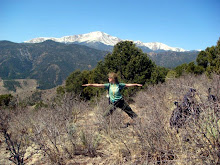
There is nothing more thrilling than being the wild one on the outer edge of the pack, seeing the horizon more clearly than those safely ensconced in the middle of the herd. It isn't easy being a lonely maverick, relying on animal instinct to find hidden dangers, while other more domesticated souls happily munch nuggets of truth dispensed by politicians and mainstream media. But someone has to lead the way.
I thought I'd found an opportunity to indulge my inner maverick. I had high hopes that the Three Cups of Tea avalanche was hiding lots of neocon propaganda, a pitiful campaign to convince those of us with bleeding hearts that, indeed, our government is engaged in noble warfare against terrorism in Pakistan and Afghanistan, the training ground for Islamic fundamentalists determined to wipe out Western culture. After all, who would know the terrorist's heart better than Greg Mortenson who has spent much of the past fifteen years in remote Himalayan villages developing relationships with local leaders and gaining an understanding of these tribal cultures?
Well, I'm disappointed to admit that, after finishing the book, I am smack in the middle of the Mortenson love fest. Other than forgetfulness, disorganization and a chronic lack of punctuality, I can find no fault with this man (I feel like Pontius Pilate). After the 9/11 attacks, the book gets a whole lot better. The writing, literally painful to read in the first half, begins to flow in such a way that you are not constantly mindful of the fact that you are reading.
Political intrigue, physical danger, unflinching bravery, and an uncanny ability to discern the good guys from the bad guys--always in pursuit of his mission of educating the rural poor--does make Mortenson seem larger than life. So much so that co-author David Oliver Relin stops mentioning his physical stature in every paragraph.
The complexity of tribal societies makes for interesting reading. Puppet governments in big cities have no standing in remote mountain villages. Tribal councils and religious leaders in Iran interpret and enforce the law. Mortenson makes an interesting distinction between warlords who take tariffs from opium smugglers to create private militias and commandhan who plow the profits into the people's welfare. One bad, the other good. He makes few moral judgments of the mountain people and their ways, poppy production included. He saves his scathing indictments for the US government and its minions, and seemingly refuses to cooperate or be used by them in any way.
I hope I can find a front row seat tonight and catch Mortenson's eye. I want to give him the oft-sought-but-ever-elusive Mango wink of approval. Some maverick, she.
Tuesday, January 15, 2008
Polly put the kettle on
Posted by
Marie Walden
at
1:29 PM
![]()
Labels: Books, Education, Propaganda, Terrorism
Subscribe to:
Post Comments (Atom)


2 comments:
I expected somewhat of a bravado persona, and found instead a humble man, almost uncomfortable in front of all those people. You could tell he'd much rather be back in a remote village doing what he does best. Genuine, through and through I'd say....
I was pleasantly surprised.
Nice title.
I grew weary of the book in the first half and put it down - later agreeing with your earlier post. Now I guess I better go finish it. Thanks for the heads-up!
Post a Comment